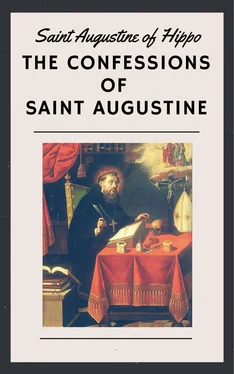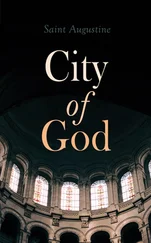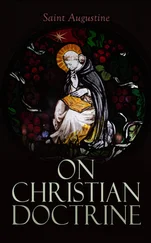For what more miserable than a miserable being who commiserates not himself; weeping the death of Dido for love to Aeneas, but weeping not his own death for want of love to Thee, O God. Thou light of my heart, Thou bread of my inmost soul, Thou Power who givest vigour to my mind, who quickenest my thoughts, I loved Thee not. I committed fornication against Thee, and all around me thus fornicating there echoed "Well done! well done!" for the friendship of this world is fornication against Thee; and "Well done! well done!" echoes on till one is ashamed not to be thus a man. And for all this I wept not, I who wept for Dido slain, and "seeking by the sword a stroke and wound extreme," myself seeking the while a worse extreme, the extremest and lowest of Thy creatures, having forsaken Thee, earth passing into the earth. And if forbid to read all this, I was grieved that I might not read what grieved me. Madness like this is thought a higher and a richer learning, than that by which I learned to read and write.
But now, my God, cry Thou aloud in my soul; and let Thy truth tell me, "Not so, not so. Far better was that first study." For, lo, I would readily forget the wanderings of Aeneas and all the rest, rather than how to read and write. But over the entrance of the Grammar School is a vail drawn! true; yet is this not so much an emblem of aught recondite, as a cloak of error. Let not those, whom I no longer fear, cry out against me, while I confess to Thee, my God, whatever my soul will, and acquiesce in the condemnation of my evil ways, that I may love Thy good ways. Let not either buyers or sellers of grammar-learning cry out against me. For if I question them whether it be true that Aeneas came on a time to Carthage, as the poet tells, the less learned will reply that they know not, the more learned that he never did. But should I ask with what letters the name "Aeneas" is written, every one who has learnt this will answer me aright, as to the signs which men have conventionally settled. If, again, I should ask which might be forgotten with least detriment to the concerns of life, reading and writing or these poetic fictions? who does not foresee what all must answer who have not wholly forgotten themselves? I sinned, then, when as a boy I preferred those empty to those more profitable studies, or rather loved the one and hated the other. "One and one, two"; "two and two, four"; this was to me a hateful singsong: "the wooden horse lined with armed men," and "the burning of Troy," and "Creusa's shade and sad similitude," were the choice spectacle of my vanity.
Why then did I hate the Greek classics, which have the like tales? For Homer also curiously wove the like fictions, and is most sweetly vain, yet was he bitter to my boyish taste. And so I suppose would Virgil be to Grecian children, when forced to learn him as I was Homer. Difficulty, in truth, the difficulty of a foreign tongue, dashed, as it were, with gall all the sweetness of Grecian fable. For not one word of it did I understand, and to make me understand I was urged vehemently with cruel threats and punishments. Time was also (as an infant) I knew no Latin; but this I learned without fear or suffering, by mere observation, amid the caresses of my nursery and jests of friends, smiling and sportively encouraging me. This I learned without any pressure of punishment to urge me on, for my heart urged me to give birth to its conceptions, which I could only do by learning words not of those who taught, but of those who talked with me; in whose ears also I gave birth to the thoughts, whatever I conceived. No doubt, then, that a free curiosity has more force in our learning these things, than a frightful enforcement. Only this enforcement restrains the rovings of that freedom, through Thy laws, O my God, Thy laws, from the master's cane to the martyr's trials, being able to temper for us a wholesome bitter, recalling us to Thyself from that deadly pleasure which lures us from Thee.
Hear, Lord, my prayer; let not my soul faint under Thy discipline, nor let me faint in confessing unto Thee all Thy mercies, whereby Thou hast drawn me out of all my most evil ways, that Thou mightest become a delight to me above all the allurements which I once pursued; that I may most entirely love Thee, and clasp Thy hand with all my affections, and Thou mayest yet rescue me from every temptation, even unto the end. For lo, O Lord, my King and my God, for Thy service be whatever useful thing my childhood learned; for Thy service, that I speak, write, read, reckon. For Thou didst grant me Thy discipline, while I was learning vanities; and my sin of delighting in those vanities Thou hast forgiven. In them, indeed, I learnt many a useful word, but these may as well be learned in things not vain; and that is the safe path for the steps of youth.
But woe is thee, thou torrent of human custom! Who shall stand against thee? how long shalt thou not be dried up? how long roll the sons of Eve into that huge and hideous ocean, which even they scarcely overpass who climb the cross? Did not I read in thee of Jove the thunderer and the adulterer? both, doubtless, he could not be; but so the feigned thunder might countenance and pander to real adultery. And now which of our gowned masters lends a sober ear to one who from their own school cries out, "These were Homer's fictions, transferring things human to the gods; would he had brought down things divine to us!" Yet more truly had he said, "These are indeed his fictions; but attributing a divine nature to wicked men, that crimes might be no longer crimes, and whoso commits them might seem to imitate not abandoned men, but the celestial gods."
And yet, thou hellish torrent, into thee are cast the sons of men with rich rewards, for compassing such learning; and a great solemnity is made of it, when this is going on in the forum, within sight of laws appointing a salary beside the scholar's payments; and thou lashest thy rocks and roarest, "Hence words are learnt; hence eloquence; most necessary to gain your ends, or maintain opinions." As if we should have never known such words as "golden shower," "lap," "beguile," "temples of the heavens," or others in that passage, unless Terence had brought a lewd youth upon the stage, setting up Jupiter as his example of seduction.
"Viewing a picture, where the tale was drawn,
Of Jove's descending in a golden shower
To Danae's lap a woman to beguile."
And then mark how he excites himself to lust as by celestial authority:
"And what God? Great Jove,
Who shakes heaven's highest temples with his thunder,
And I, poor mortal man, not do the same!
I did it, and with all my heart I did it."
Not one whit more easily are the words learnt for all this vileness; but by their means the vileness is committed with less shame. Not that I blame the words, being, as it were, choice and precious vessels; but that wine of error which is drunk to us in them by intoxicated teachers; and if we, too, drink not, we are beaten, and have no sober judge to whom we may appeal. Yet, O my God (in whose presence I now without hurt may remember this), all this unhappily I learnt willingly with great delight, and for this was pronounced a hopeful boy.
Bear with me, my God, while I say somewhat of my wit, Thy gift, and on what dotages I wasted it. For a task was set me, troublesome enough to my soul, upon terms of praise or shame, and fear of stripes, to speak the words of Juno, as she raged and mourned that she could not
"This Trojan prince from Latinum turn."
Which words I had heard that Juno never uttered; but we were forced to go astray in the footsteps of these poetic fictions, and to say in prose much what he expressed in verse. And his speaking was most applauded, in whom the passions of rage and grief were most preeminent, and clothed in the most fitting language, maintaining the dignity of the character. What is it to me, O my true life, my God, that my declamation was applauded above so many of my own age and class? is not all this smoke and wind? and was there nothing else whereon to exercise my wit and tongue? Thy praises, Lord, Thy praises might have stayed the yet tender shoot of my heart by the prop of Thy Scriptures; so had it not trailed away amid these empty trifles, a defiled prey for the fowls of the air. For in more ways than one do men sacrifice to the rebellious angels.
Читать дальше












